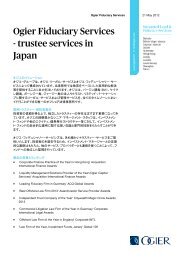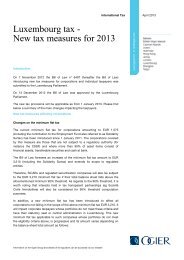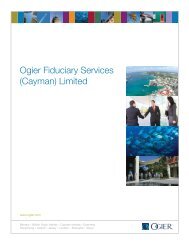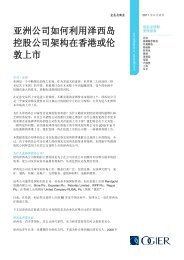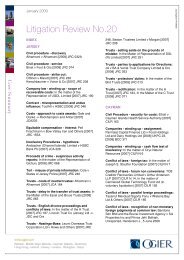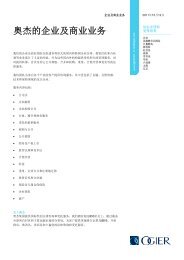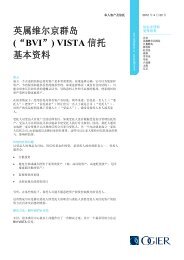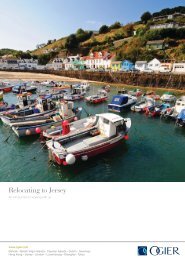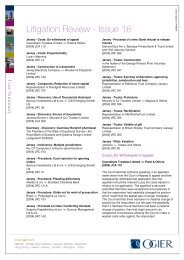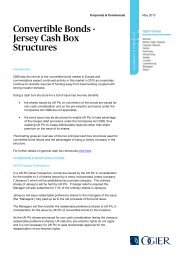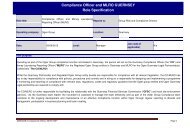Litigation Review - No. 19 - Ogier
Litigation Review - No. 19 - Ogier
Litigation Review - No. 19 - Ogier
Create successful ePaper yourself
Turn your PDF publications into a flip-book with our unique Google optimized e-Paper software.
April 2008<strong>Litigation</strong> <strong>Review</strong> - <strong>No</strong>. <strong>19</strong>Trusts - variationImplements new Royal Court Civil RulesCase SummaryIn the matter of the Bruno Sangle-FerrierChildren’s Settlement [2006] JRC <strong>19</strong>3This concerned an application by the trustees of theBruno Sangle-Ferrier Children’s Settlement seeking theCourt’s approval to the variation of certain provisions ofthe Settlement. The variations were designed to allow forfiscal savings (which were supported by the guardian adlitem for the minor and unborn beneficiaries) and includedinter alia the provision of a power to add beneficiaries.Although in one sense the power to increase thebeneficial class could be said to be contrary to theinterests of the children of the settlor in so far as it couldbe increased potentially to their detriment, the power toadd beneficiaries was subject to the consent of theprotector and was a quite usual power, whose exercisewas subject to the control of the Court. The Court tookinto account the fact that fiscal savings were an importantconsideration which, if in the interests of all thebeneficiaries, may justify a variation. In light of thesefactors, the Court allowed the variation.GUERNSEY CASESFreezing Injunction: disclosure orderGarnet Investments Ltd v BNP Paribas(Suisse) SA, Royal Court, 23 May 2007An interlocutory freezing order had been obtained by theGovernment of Indonesia in respect of funds held by thePlaintiffs at a Guernsey bank, BNP Paribas (Suisse) SA(“BNP”). The Plaintiffs applied for the freezing order to bedischarged on the basis that the Government ofIndonesia did not have a good arguable case but theRoyal Court disagreed and ruled that the freezing ordershould continue.The Government’s case was that the funds over whichthe freezing order had been obtained were beneficiallyowned by Mr Hutomo Putra, one of the sons of the lateformer ruler of Indonesia, President Soeharto. Mattershad come to a head in 2002 when the Plaintiffs issuedpayment instructions concerning the funds (which hadbeen deposited with BNP in <strong>19</strong>98). BNP refused toaction these instructions because the Guernsey FinancialIntelligence Service refused to consent to the payment.The Court held that the Government of Indonesia had anarguable case against Mr Putra arising out of allegationsof corruption and furthermore that there was a real risk ofdissipation of the Guernsey funds. The Plaintiffs werealso ordered to give disclosure of its financial transactionssince its establishment.On 4 October 2007 it was announced that with effect from4 February 2008 the existing Royal Court Civil Ruleswould be replaced in their entirety by the Royal CourtCivil Rules 2007. The intention behind the new rules wasto simplify, clarify and streamline Guernsey’s civilprocedure and to give litigants and judges more moderntools to enable the courts to deal with cases justly.Here are details of some of the most significant changes.As before, the plaintiff must table a claim document(“cause”) before the Court containing the material factsrelied on and a statement of the relief sought. The plaintiffmust give 2 days’ notice of the intention to table a cause,by serving a summons on the defendant. A new feature ofthe process is that a defendant is required to table hisdefences to the action 28 days after the action is listed onthe Role des Causes a Plaider (such period can beextended by up to 3 months by agreement between theparties).From 4 February 2008 Exceptions de Forme will bedeemed to be a request by a defendant for furtherinformation. The new rules also contain provisionspermitting both plaintiffs and (for the first time) defendantsto apply for summary judgment. There are also newprovisions for interpleader relief and for therepresentation of interested persons whose identity /whereabouts cannot be ascertained. These will bewelcomed in particular where issues before the courtconcern, for example, the estate of a deceased person, atrust or the meaning of a document.The Rules also introduce a number of case managementpowers, including a long non-exhaustive list of casemanagement techniques. It is anticipated that a casemanagement conference will be held in the majority ofcivil cases. For cases proceeding under the new rules,the Court must consider whether the trial is to be heardby a single judge sitting alone or by a judge sitting withJurats. A pre-trial review will take place in most cases.Any party to an action may at any time make a paymentinto the court in satisfaction of any claim against him oroffer to settle the whole or any part of the claim made byor against him in the action. This is Guernsey’s equivalentto Part 36 of the English Civil Procedure Rules.There are changes too to the disclosure regime.Guernsey has adopted a very wide definition of whatconstitutes a “document” and the disclosure procedure isnow more streamlined. In most cases, disclosure ofdocuments will be limited to “standard disclosure”. A dutyto make a reasonable search is imposed upon parties tolitigation and the duty of disclosure remains a continuingone.The Plaintiffs have appealed against the judgment andthe appeal is likely to be heard in March 2008.Finally, for the first time the court has power to make anorder for payment of costs at the conclusion of a hearingor application at any interim stage.ADMIN-14369297-2



